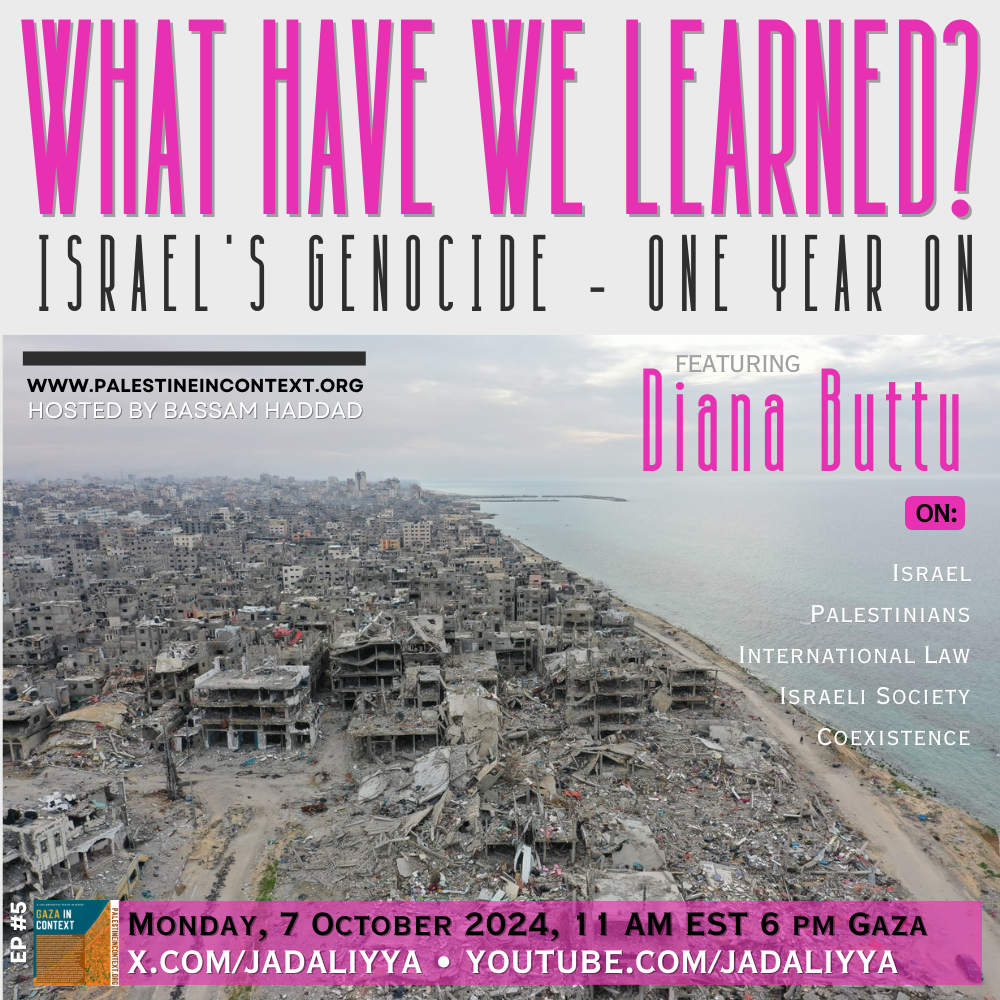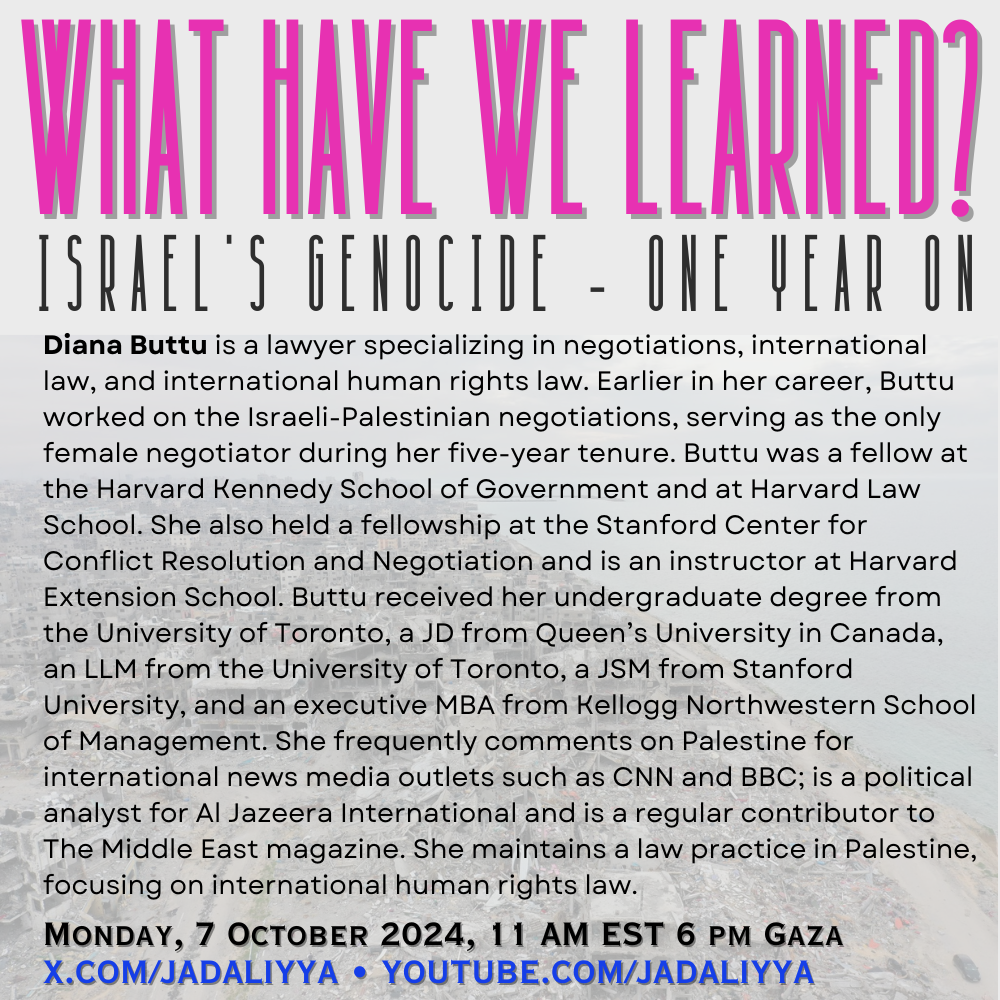Gaza in Context: A Collaborative Teach-In Series
What Have We Learned?
Israel’s Genocide — One Year On
Featuring:
Diana Buttu
Hosted by:
Bassam Haddad
Monday, 7 October 2024
11:00 AM EST | 6:00 PM Palestine
Join our fourth edition of “What Have We Learned?” after one year of Israel’s Genocide with Diana Buttu, hosted by Bassam Hadddad. Scholars, journalists, activists, and authors select 5 themes/topics and analyze what we have learned about them.
Gaza in Context Project is billing this series as lessons learned, one year on, to break through the fog of observations, narratives, data, propaganda, and images we unfathomably continue to access/witness every day. These conversations are relatively short, intense, and insightful, delivered by thoroughly engaged speakers.
Gaza in Context Collaborative Teach-In Series
We are together experiencing a catastrophic unfolding of history as Gaza awaits a massive invasion of potentially genocidal proportions. This follows an incessant bombardment of a population increasingly bereft of the necessities of living in response to the Hamas attack in Israel on October 7. The context within which this takes place includes a well-coordinated campaign of misinformation and the unearthing of a multitude of essentialist and reductionist discursive tropes that depict Palestinians as the culprits, despite a context of structural subjugation and Apartheid, a matter of consensus in the human rights movement.
The co-organizers below are convening weekly teach-ins and conversations on a host of issues that introduce our common university communities, educators, researchers, and students to the history and present of Gaza, in context.
Co-Organizers: Arab Studies Institute, Georgetown University’s Center for Contemporary Arab Studies, George Mason University’s Middle East and Islamic Studies Program, Rutgers Center for Middle Eastern Studies, Birzeit University Museum, Harvard’s Center for Middle Eastern Studies, Brown University’s Center for Middle East Studies, University of Chicago’s Center for Contemporary Theory, Brown University’s New Directions in Palestinian Studies, Georgetown University’s Center for Muslim-Christian Understanding, Simon Fraser University’s Centre for Comparative Muslim Studies, Georgetown University-Qatar, American University of Cairo’s Alternative Policy Studies, Middle East Studies Association’s Global Academy, University of Chicago’s Center for Middle Eastern Studies, CUNY’s Middle East and Middle Eastern American Center, University of Illinois Chicago’s Arab american cultural Center, George Mason University’s AbuSulayman’s Center for Global Islamic Studies, University of Illinois Chicago’s Critical Middle East Studies Working Group, George Washington University’s Institute for Middle East Studies, Columbia University’s Center for Palestine Studies, New York University’s Hagop Kevorkian Center for Near Eastern Studies


Featuring
Diana Buttu is a lawyer specializing in negotiations, international law, and international human rights law. Earlier in her career, Buttu worked on the Israeli-Palestinian negotiations, serving as the only female negotiator during her five-year tenure. Buttu was a fellow at the Harvard Kennedy School of Government and at Harvard Law School. She also held a fellowship at the Stanford Center for Conflict Resolution and Negotiation and is an instructor at Harvard Extension School. Buttu received her undergraduate degree from the University of Toronto, a JD from Queen’s University in Canada, an LLM from the University of Toronto, a JSM from Stanford University, and an executive MBA from Kellogg Northwestern School of Management. She frequently comments on Palestine for international news media outlets such as CNN and BBC; is a political analyst for Al Jazeera International and is a regular contributor to The Middle East magazine. She maintains a law practice in Palestine, focusing on international human rights law.
Bassam Haddad (Host) is Founding Director of the Middle East and Islamic Studies Program and Associate Professor at the Schar School of Policy and Government at George Mason University. He is the author of Business Networks in Syria: The Political Economy of Authoritarian Resilience (Stanford University Press, 2011) and co-editor of A Critical Political Economy of the Middle East (Stanford University Press, 2021). Bassam is Co-Founder/Editor of Jadaliyya Ezine and Executive Director of the Arab Studies Institute. He serves as Founding Editor of the Arab Studies Journal and the Knowledge Production Project. He is co-producer/director of the award-winning documentary film, About Baghdad, and director of the acclaimed series Arabs and Terrorism. Bassam is Executive Producer of Status Podcast Channel and Director of the Middle East Studies Pedagogy Initiative (MESPI). He received MESA's Jere L. Bacharach Service Award in 2017 for his service to the profession. Currently, Bassam is working on his second Syria book titled Understanding The Syrian Tragedy: Regime, Opposition, Outsiders (forthcoming, Stanford University Press).
